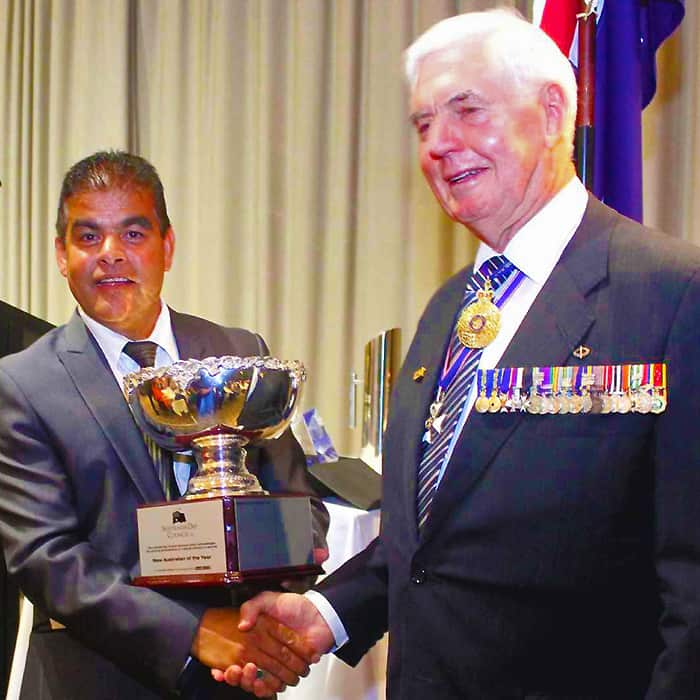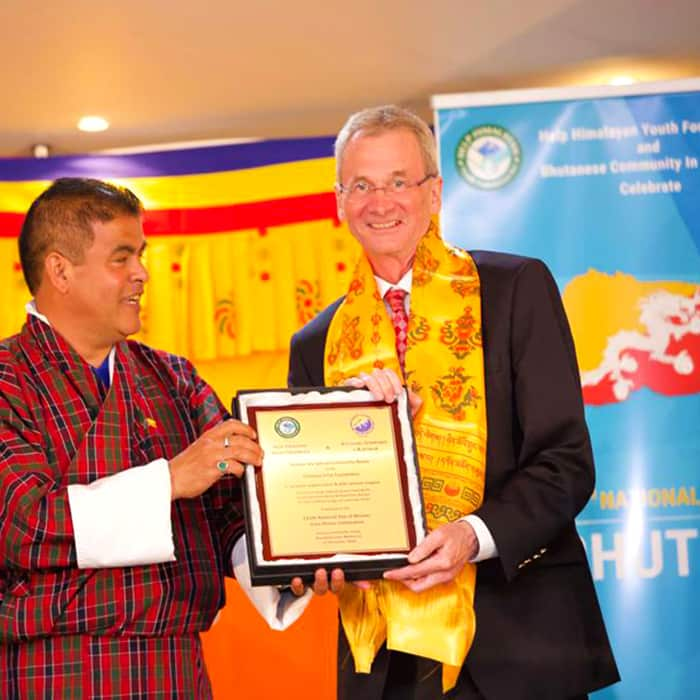Melbourne resident Parsuram Sharma-Luital is a man with a busy schedule. Most of his time is spent on community events and services.
He is a go-to man, not only for many people of Bhutan, where he is originally from but for people from many other new communities.
He won the New Australian of the Year Award and was recently named a Multicultural Champion in Victoria for 2018. This isn’t the only recognition he has received for his contribution to diversity. Yet, for this man who is known for supporting the empowerment of new communities, there is one big fight he is struggling to win within his own Bhutanese community.
Yet, for this man who is known for supporting the empowerment of new communities, there is one big fight he is struggling to win within his own Bhutanese community.

Source: Supplied
“Caste discrimination is rampant within our community,” Sharma-Luital tells SBS Nepali.
“People from so-called upper castes - they don’t see this discrimination, they don’t feel it. But the ones from lower castes can tell you all about their bitter experience.”
Sharma-Luital himself says he has been through those unpleasant experiences.
Although he belongs to a so-called ‘upper caste’ family, his wife is from a different caste, and his inter-caste marriage now makes him an outsider at religious events held in the community.
“When I go to any religious rituals, I am told to step out from the place where pooja [god worship] is performed,” he says.
“The Hindu Brahmin priests know about my marriage, and they ignore me and discriminate against me.”
The situation is now so bad, says Sharma-Luital, that his wife Tanka Maya Sharma-Luital has stopped attending many of these religious events.
“What’s the point of going to these events, where you cannot help and are separated from the rest - only because you belong to a different caste? It hurts.”
Though illegal, caste discrimination is common in many areas of South Asian countries, including India, Nepal and Bhutan.
Brahmins are considered as the upper-most caste and are perceived as a source of knowledge and wisdom.
Inter-caste marriage was deemed to be off-limits in the old days, but things are now improving now, mostly in urban areas.
Still, some community leaders say many people that have arrived in Australia in the latter part of their lives find it hard to be rid of this discriminatory practice.
“I have never experienced any discrimination based on the caste system.”
More than 6,500 Bhutanese are thought to be currently residing in Australia as part of the Australian Government’s commitment to refugee resettlement.
During the 1990s, more than 100,000 Bhutanese were living in refugee camps in Nepal, after the Bhutanese government forced its Nepali-speaking citizens to leave the country.
Dambar Dhungel of the Bhutanese Association in Australia says it is hard to change the culture, which is deeply ingrained in the mindset of some.
“How can you expect them to change their view when they have always practised this social norm?” he says.
But Dhungel denies witnessing any discrimination based on caste.
“My marriage is inter-caste too,” he says.
“I have never experienced any discrimination based on the caste system.”
But Jeevan Koirala from South Australia has a different story to tell.
He tells SBS Nepali that he and few others were forced to start an advocacy forum, Cohesion Matters, after witnessing discrimination in his community.
The charity organisation has also published a video to highlight alleged discrimination by priests within the community. However, participants of that video were later boycotted by a group of Bhutanese priests, says Koirala.
“Bhutanese priests won’t conduct the rituals in my house as well,” he says. “I am outcast too because I raised a voice against this malpractice.”
Koirala retells a story that occurred in 2012 highlighting the extent of discrimination.
“One of our friends, who happened to be from lower-caste, was in need to perform some ritual after he lost a member of his family. But a group of Bhutanese priests decided not to perform because he was from so-called ‘untouchable caste’.”
One of the priests that we contacted told us that all the cultural practices could not be changed in the name of modernisation.
“Yes, we can have leeway in few things, but not all,” he said, declining to elaborate further.
Another well-known priest from Sydney, who also did not want to disclose his name, believes that it is the Bhutanese society that needs to be blamed for this discrimination.
“If somehow people found out that I have performed ‘pooja’ in the house of so-called ‘untouchables’, then the view of society towards me will change,” he says. “I will lose credibility, and I don’t want to risk my livelihood… so please don’t only target us as a group that is preventing the change.”
“I will lose credibility, and I don’t want to risk my livelihood… so please don’t only target us as a group that is preventing the change.”

Source: Supplied
Sharma-Luital, on the other hand, believes that the community should tackle this discrimination head-on.
“Just because you are from a so-called lower caste, people cannot discriminate against you,” he says.
“Truly, it is a violation of human rights.”
Share
